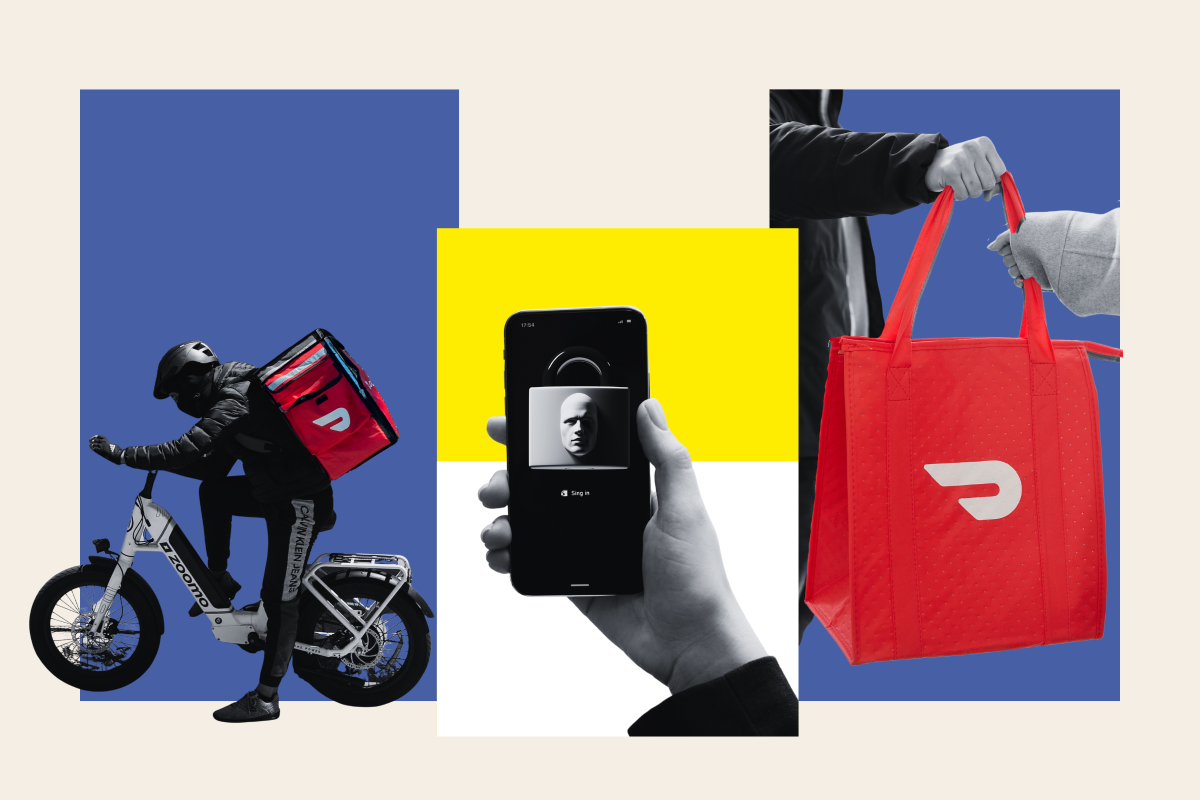Online food delivery platform DoorDash has adopted changes to its driver verification system months after U.S. lawmakers questioned whether it and similar services were being co-opted by illegal migrants "gaming the system." Some wonder whether it will be enough.
On December 12, DoorDash announced more rigorous safeguards to better deter "bad actors" from profiting off deliveries and the platform. In April, Republican Senators Marsha Blackburn, Mike Braun and Ted Budd sent letters to DoorDash, Grubhub and Uber Eats as part of a probe demanding to know whether illegal migrants are "gaming the system" while using fake identities. Immigration was a top campaign issue for President-Elect Donald Trump.
Venezuelan migrants told The Daily Mail that food delivery is a good way to integrate into the U.S. and make quick money, while others online flaunt driver IDs for sale on social media sometimes for hundreds of dollars.
New DoorDash protocols that must now be followed include requiring select "Dashers" to re-verify their identity between deliveries; aided by deploying machine learning technology to better detect signs of inauthentic activity. The San Francisco-based company also promises to increase its real-time identity checks to over 150,000 a week, with a rollout program already underway across the U.S.
The company has rolled out its updated safeguards—frequent identity re-verification and new machine learning technology—in the following U.S. cities: Atlantic City, Boulder, Denver, Fort Myers, Los Angeles, Orlando, Sacramento, San Francisco, Seattle and Yakima. They plan to roll it out more widely through the end of the year and into 2025, according to DoorDash spokesperson Jenn Rosenberg.
When asked why Texas cities on the frontlines of the border battle that played a pivotal role in the presidential election weren't among those in the DoorDash re-verification rollout plan, Rosenberg told Newsweek, "We have rolled this out to a diverse array of cities to start, as we do with any new feature we launch."
Some drivers told Newsweek that the re-verification process not only stunt drivers' ability to remain consistent in their deliveries and profits but also puts customers at a safety disadvantage because someone delivering their food may not be who they say they are.
"We're always looking for ways to make the platform even safer and even more secure," Rosenberg told Newsweek. "The external landscape has changed drastically over the past decade, and we've consistently adapted to introduce new measures to keep all of our users safe."

The company began re-verifying Dasher identities in August 2023, which led to up to 100,000 drivers having to re-verify their identities weekly by early 2024—and since has climbed to 150,000. Criminal background checks have been conducted since 2014.
That 150,000 figure represents a mix of regular re-verification efforts and targeting specific Dashers if their technology detects signals of potential inauthenticity, Rosenberg added.
As of December 2024, the company said its screening process prevents over 15,000 prospective Dashers from joining the platform/driving due to failing to submit the necessary criteria. Monthly deactivations of inauthentic accounts have more than doubled compared to 2023, with all of that year's deactivations already being surpassed by July 2024.
The company also says it prevents, weekly and on average, about 4,600 attempts by deactivated Dashers who previously violated verification policies from regaining access.
The company, founded in 2013 and currently in 25 countries, said in its third-quarter earnings report that total U.S. orders increased 18 percent year over year to 643 million, and revenue increased 25 percent year over year to $2.7 billion.
Illegal migrant impact on new provisions
The danger posed for consumers, notably women, seniors and individuals ordering at night, is compounded by the fact that drivers illegally in the country could not be tracked by law enforcement authorities and be brought to justice, the GOP lawmakers said earlier this year.
A spokesperson for Blackburn referred Newsweek to her December 12 post on X expressing contentment with DoorDash and one of its competitors, GrubHub, for taking steps "to enhance security and remove illegals from being able to sign up as drivers." She also asked why Uber Eats hasn't done the same.
An Uber spokesperson refuted the claim, telling Newsweek that the company appreciates the senators' concerns and responded to their April letter with more information on their "strict policies and processes in place to help prevent and address account sharing."
That includes a "Real-Time ID Check" that requires couriers to periodically take a selfie to help verify their identity, either before going online or occasionally during trips. If selfies don't match the profile originally created, drivers "may" lose account access.
Last year, Uber began renewing audits of accounts for fraudulent behavior in some localities and is regularly working to increase enforcement, they added.
"All couriers who deliver with Uber are required to hold a valid right to work in the US, pass a criminal background check, and be over the age of 18," the spokesperson said. "If a courier is found to be sharing their account or using a fraudulent account, we remove their access to our platform. No exceptions."
A GrubHub spokesperson told Newsweek that following the senators' inquiry, the platform shared details about its ID verification process and fraud monitoring systems.
GrubHub has since partnered with Incognia, a fraud prevention technology company, to make it even harder for unauthorized account use—which the company calls "already infrequent"—to occur.
"We're always working to improve these systems to keep things safe and reliable for everyone—customers, restaurants and delivery partners alike," the spokesperson said.
An inquiry from Newsweek to the senators about what specific incidents, reports and/or complaints spurred the letter earlier this year received no response.
When asked how Blackburn and her colleagues' concerns impacted their own policies, Rosenberg said that neither a singular issue nor criticism played a role in the revamped ID system.
"These efforts are not in response to any specific issue; they're about making sure that we know who is using our platform," Rosenberg said. "Our users and the public rightly expect us to know who is handling their orders, entering their business, and delivering to their homes. This latest crackdown is all about further bolstering and strengthening our existing safeguards to ensure that every Dasher is following the rules and is who they say they are."
She added: "To be extremely clear: immigrants are welcome to Dash, full stop. Immigrants must meet the same standards as any other Dasher: Regardless of background, they must submit an SSN to complete and pass a background check, and submit a selfie that matches a valid government-issued ID."
Edward Preston, a Dasher in his mid-forties in the San Antonio, Texas, area, disagrees with the company's overall assessment.
The ex-digital project manager lives in an owned rental unit and, during the COVID pandemic, viewed Dashing as a means of making income for outside spending. In over two years, he conducted over 5,000 deliveries and attained a "Platinum" tier status.
Money was good, he told Newsweek, so much so that making $25 an hour was done "without breaking a sweat."
"There's a bad hour here or there," he said. "There might even be a bad shift here or there, a bad day here or there. But over the course of the week, it's insanely stable as long as you're not an idiot, as long as you understand how the system works.
"Once you, once you start seeing a drop-off in income, it's a symptom. It's a warning sign."
That sign for him came in February when someone tried to steal his identity. But money dwindled and didn't pick up like it usually did around August when schools reopen and there's a usual uptick in orders and deliveries.
Normally traditional hot "zones" of money-making became overly saturated with drivers out of nowhere, he added. He said he often chats in Spanish with foreign drivers, many of which tell him they are from Venezuela.
"[Us drivers] run into each other all day long at these various businesses and restaurants and so forth," he said. "We chat it up. I chat with the migrants, too. I'm a grandson of an immigrant. I'm sympathetic for them but I'm a rules guy first."
Preston said he personally met countless "unqualified" individuals—estimating that the senators' concerns about hundreds of unverified or illegal drivers could be understated on a national scale.
He alleged "fraudulent" accounts are commonly sold or shared via the dark web or openly in Facebook groups. In August, Preston said he hadn't been re-identified by the app in over two years.
Now, he tells Newsweek that bursts of business elevated by what DoorDash refers to as "peak pay" or promo pay where incentives are provided in given days and times—such as during the college football season in Texas—have waned significantly.
"There's almost zero promo pay going on," he said. "The only reason they offer promo pay is to get more people on the road. So, for them to not have to offer it over the last six months basically less and less to the point where it's almost none tells me that they are utterly saturated with drivers. There's only one way that they're saturated and the other apps aren't."
He's referred to Venezuelans he's encountered as "unauthorized drivers," which he says is why they're using other people's identities. He also acknowledges uncertainty of whether they are legal refugees or illegal immigrants.
"The point here is very important: they are using other people's IDs for a reason, but not necessarily because they're not documented," he said.

Virginia Farr, an ex-DoorDash driver formerly in the San Ramon area about three dozen miles from San Francisco, said she quit the app earlier this year and moved to Uber and Amazon Flex because business was better.
She claimed she was only asked to verify twice in approximately 7,800 deliveries.
"Because of the algorithm, I worked like 45 hours and only received nine deliveries," Farr said. "I went out of town and was never able to recover. This algorithm took me off of catering orders and support did not realize it months into being Platinum. I used to get actual high-paying orders all the time; the faulty algorithm impacts that, coupled with all the Dashers from South America."
Now located in Oregon, she echoed Preston's conversations with Spanish-speaking drivers who she said allegedly admitted to sharing driver info so they could make money.
Preston said that he and other drivers have to submit a selfie that customers never see, along with ID, during the initial sign-up and verification process. However, he's never had to re-identify since.
He said that's assumedly how the fake profiles have accelerated and turned into somewhat of a black market, where legal citizens are creating accounts, verifying them, and then selling or sharing them with unauthorized drivers.
Rosenberg said the perspectives of Preston and Farr are anecdotal and "not representative of the whole at all" when considering the thousands of others who drive for DoorDash. Their claims also pre-date the company's recent announcement, she added.
"We're doing even more to enhance and strengthen our safeguards and [are] finding even more sophisticated ways to target Dashers who display signs of inauthenticity," Rosenberg said.




















 English (US) ·
English (US) ·